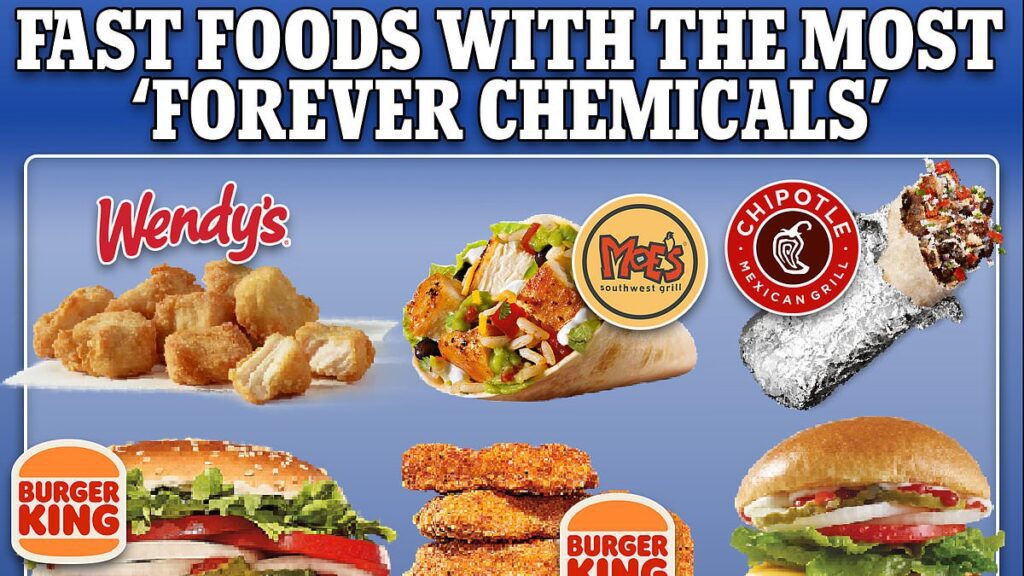In a shocking revelation, the coveted square-patty home of “always fresh, never frozen” burgers, Wendy’s, has been revealed as the fast-food king—not of flavor, but rather of toxic, microscopic toxins in its meals. An analysis commissioned by watchdog Consumer Reports found Wendy’s offering chicken nuggets possessed up to 10 times more phthalates—a ‘forever chemical’ linked to cancer, fertility issues, and autism—than food sold at rival chains. These staggering figures serve as a chilling reminder of the silent invaders lurking in our everyday meals, invisible to the naked eye, but with potential long-term devastation.
REVEALED: The fast food restaurants with highest levels of hormone-warping chemicals https://t.co/MPi9HRobFg pic.twitter.com/MzkTRauqEY
— Daily Mail Online (@MailOnline) January 12, 2024
Rated as America’s favorite fast foods, 18 meals from nine fast-food restaurants, including staple brands McDonald’s, Burger King, and Taco Bell, were tasted, not by customers, but by researchers for phthalate content. The results were startling. Going down the list, Moe’s Southwest Grill chicken burrito claimed a close second, and Chipotle’s chicken burrito came third—completing the podium of toxicity. Together, these findings shed light on the far-reaching and pervasive nature of phthalates in our daily diet.
Phthalates, notorious ‘forever chemicals’, belong to a group of chemicals used to fortify plastics such as food containers, bags, and disposable cutlery. The adjective ‘forever’ aptly encapsulates their persistent and indelible nature—they can’t be broken down once they lodge in the body, perpetually wreaking havoc upon human health.
Bringing science to your dinner table, the researchers purchased two to three samples of each fast food item from widely recognized brands like Little Caesars, Domino’s, and Pizza Hut across the United States. The average phthalates content hovered around 12,000 nanograms (ng) per serving—Wendy’s crispy chicken nuggets alone contained 33,980 ng of phthalates per serving.
Looking into the how’s, the report revealed that these dangerous chemicals enter our food when it comes in contact with packaging—often plastic-coated. It may also happen during food preparation where plastic gloves shed phthalates onto the very items they seek to protect from contamination. Plants absorbing chemicals from the soil can turn out to be another significant source. The health implications linked to these insidious chemicals range from asthma, ADHD, breast cancer, obesity, type 2 diabetes, to several birth defects, including low IQ, behavioral issues, autism, altered reproductive development, and male infertility.
Tundle Akinleye, the scientist at the helm of this testing, expressed discomfort, saying they don’t feel comfortable deeming these levels acceptable. The analysis underscored the importance of the need for stringent regulations to safeguard public health.
The fast-food industry’s impact doesn’t stop at its contribution to obesity and heart disease. It now finds itself at the center of a larger controversy where the simple act of consuming iconic meals could lead to a lifelong sentence of health complications. One can’t help but consider the irony—products promising convenience, speed, and gratification may carry an incredibly high and, quite possibly, irreversible cost on our health.
The conclusion is stark yet straightforward. While Wendy’s, Moe’s Southwest Grill, and Chipotle might pour marketing dollars into tempting advertising, Consumer Reports’ findings underscore an urgent need for corrective action. As we raise our fountain drinks to another convenient meal, it’s time to question what exactly we’re consuming. Silent chemicals, potential health risks, or simply a craving satiated? Consumer awareness, matched with corporate transparency, could pave the way to safer fast-food practices. Until then, order wisely, for the real cost of your quick meal may not be clearly printed on your bill.



